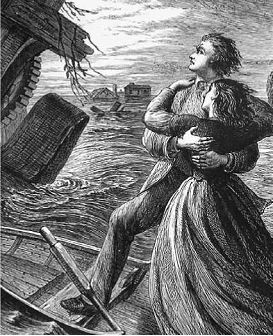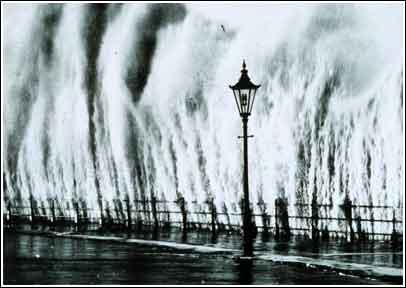Flood on the Floss
August 28th, 2011
With hurricane Irene dominating every local media outlet, flooding is very much on our minds here in Greenwich Village. Which reminds me of my favorite (so far) literary flood, from the dramatic final volume of George Elliot’s The Mill on the Floss.

“At that moment Maggie felt a startling sensation of sudden cold about her knees and feet: it was water flowing under her. She started up: the stream was flowing under the door that led into the passage. She was not bewildered for an instant— she knew it was the flood! . . .
“And without a moment’s shudder of fear, she plunged through the water, which was rising fast to her knees, and by the glimmering light of the candle she had left on the stairs, she mounted on to the window-sill, and crept into the boat, which was left with the prow lodging and protruding through the window. Bob was not long after her, hurrying without shoes or stockings, but with the lanthorn in his hand. . .
“She was floating in smooth water now—perhaps far on the over-flooded fields. There was no sense of present danger to check the outgoing of her mind to the old home; and she strained her eyes against the curtain of gloom that she might seize the first sight of her whereabout—that she might catch some faint suggestion of the spot towards which all her anxieties tended. . .
“For the first time Maggie’s heart began to beat in an agony of dread. She sat helpless—dimly conscious that she was being floated along—more intensely conscious of the anticipated clash. But the horror was transient: it passed away before the oncoming warehouses of St Ogg’s: she had passed the mouth of the Ripple, then: now, she must use all her skill and power to manage the boat and get it if possible out of the current.”
What? You’re frustrated because I’ve left so much out — including the startling conclusion to Maggie’s boat ride? Well I guess you’ll just have to get a copy of the book and read it for yourself!
West Indian Monster
August 27th, 2011
As choruses of “Irene, Goodnight” ring out from the more enlightened tenements in Greenwich Village, I can’t help regretting the days when storms were christened in more poetic fashion. We don’t yet know whether Hurricane Irene’s New York landfall — forecast for the wee sma’s of Sunday, August 28, 2011 — will enter the annals of history as a great disaster, but it did get me wondering about New York’s previous hurricane history.
The City’s worst recorded storm took place in early September, 1821. It first made landfall in North Carolina, and roared up through the Delmarva penninsula and New Jersey before slamming into New York City and Long Island. This may sound unnervingly familiar if you have been following the track of our 2011 storm. But 1821 hit much harder than Irene is likely to do. 13 foot surges from both rivers pushed across the City, entirely flooding Manhattan south of Canal Street. Jeepers!
In 1893, a serious hurricane — colorfully dubbed the “West Indian Monster” — again tore across the City and Long Island. It completely demolished, as in, it no longer exists, a small barrier island known as Hog Island (because Native Americans kept pigs there). Here’s what The New York Times had to say about conditions in Brooklyn on August 25, 1893:
“In such a savage manner did this West Indian monster of the air conduct itself that when the gray light of dawn came upon the city its inhabitants looked tremblingly forth upon a widespread scene of damage and destruction.”
Then the City was hit again in 1938, by a storm now known as “The Long Island Express.” In that case, I think I’ll let the pictures speak for themselves.


If I only had a canoe…
In all seriousness, we are well stocked with fresh water, non-perishable food, candles, and a battery powered radio. Our building stands in a zone that will only be evacuated in case of a much more serious storm. All our windows are closely flanked by other buildings — usually a source of frustration because of the miserable light that trickles down into our garret. But in this case, we are glad to be so well protected. At the worst, we may be without power for a day or two — a good excuse to turn off the computer and pay attention to something real. I’ll keep you posted.
